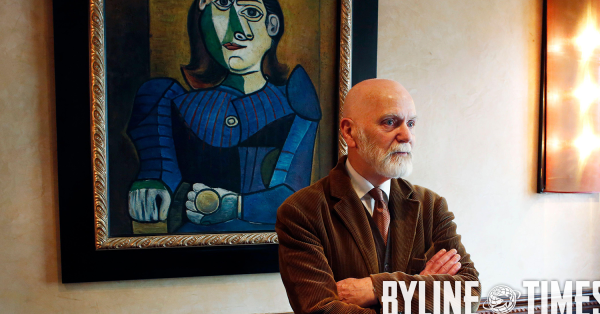Parts of the British media have expressed outrage after Renaud Camus, who originated the far-right ‘Great Replacement’ conspiracy theory was banned from entering the UK

Renaud Camus, who coined the term, “the great replacement,” stands prior to a press conference in Paris. Photo: AP Photo/Thibault Camus
Byline Times is an independent, reader-funded investigative newspaper, outside of the system of the established press, reporting on ‘what the papers don’t say’ – without fear or favour.
To support its work, subscribe to the monthly Byline Times print edition, packed with exclusive investigations, news, and analysis.
On 18 April, Renaud Camus the French far right thinker and originator of the Great Replacement conspiracy theory which states that there is a “genocidal bloc” of elites deliberately destroying the identities of white European nations through immigration, was prevented from entering the UK by the Home Office.
An email seen by the Telegraph stated that the reason given for barring his entry was that his presence was not “conducive to the public good”.
The Great Replacement theory was cited as motivation in the manifestos of the Christchurch and Buffalo mass shooters.
Camus had been on his way to speak at the “remigration conference” of the Homeland Party, a fascist, ethno-nationalist party formed out of a split in the neo-Nazi movement Patriotic Alternative.
Remigration is a euphemism on the far right for deportations of non-white minority populations from Western nations. The criteria that the Homeland party’s website gives for being “remigrated” are immigrants that are “illegal”, “unintegrated” and “unwelcome”.
Critics of remigration consider it a form of ethnic cleansing of minority populations.
Camus’ ban on entry to the UK sparked uproar in the right-wing media. Matthew Goodwin of GB News interviewed Camus, asking him softball questions.
In the interview Camus referred to his idea of the Great Replacement as “what is going on in Britain” and called it a “crime”.
Writing in Charlie Hebdo in 2021 after Camus was interviewed on the French far right news channel C News, the journalist and specialist on the French far right Jean Yves Camus (no relation) referred to it as “Fascism invited on prime time”.
Connor Mulhern of the Reactionary International Research Consortium, a group that monitors the far right told Byline Times: “The Homeland Party was formed as a splinter group from the openly white supremacist Patriotic Alternative, founded by members who sought to prioritise electoral politics over street activism. Late last year, the English branch of the pan-European extreme-right identitarian movement merged into Homeland.
At the core of the party’s message is the promotion of the so-called “great replacement” conspiracy theory, coined by Renaud Camus.
“It claims that political elites are deliberately working to replace the “indigenous” white British population with “non-indigenous” immigrants, with the party’s flyers explicitly focusing on the growing number of non-white people in the country. They assert that they are “being replaced in [their] own homeland” and advocate for the “remigration” of non-white people, regardless of whether they hold British citizenship”.
This vital context was largely omitted from coverage of Camus’ ban on entry to the UK. The ban was reported by the Telegraph and GB News. The Telegraph noted that Camus had been invited to speak at the Homeland conference but referred to it simply as the “nationalist and anti-immigration Homeland Party”.
Aurelien Mondon, the co-convenor of the Reactionary Politics Research Network, told Byline Times, “Until recently, Renaud Camus was considered as being on the extreme right, that is beyond the pale in mainstream discourse. To see this non-news story being covered by the Telegraph shows that it is no longer the more edulcorated discourse of the reconstructed far right à la Le Pen or Farage that can get positive coverage in the mainstream media, but the more extreme, emboldened kind”.
GB News made no mention of his planned speech at the Homeland conference in the article reporting the ban on their website.
ENJOYING THIS ARTICLE? HELP US TO PRODUCE MORE
Receive the monthly Byline Times newspaper and help to support fearless, independent journalism that breaks stories, shapes the agenda and holds power to account.
We’re not funded by a billionaire oligarch or an offshore hedge-fund. We rely on our readers to fund our journalism. If you like what we do, please subscribe.
Goodwin also failed to mention this context in his interview with Camus, though he did state “I would have loved to have had you in the studio to exchange some ideas and discussion with you in person”.
Douglas Murray also recently published an article on Camus, reviewing his work in a paywalled article in the New Criterion in which he writes that translations of Camus’ work will allow “a larger audience to get beyond the conspiracy slur”.
Mondon said “What we see is masks falling: while the process of normalisation owed to the far right toning down their rhetoric, its roots were in the mainstream media taking this toning down at face value, refusing to see that this was a strategic move rather than a deeper ideological shift.
“For too long, we have looked at the process of mainstreaming as something that is led by the far right while we should have focused on the actions of those who have the most power to shape the agenda and public discourse. It is them who have allowed incredibly dangerous politics, both for many communities and democracy more generally, to become re-legitimised”.




